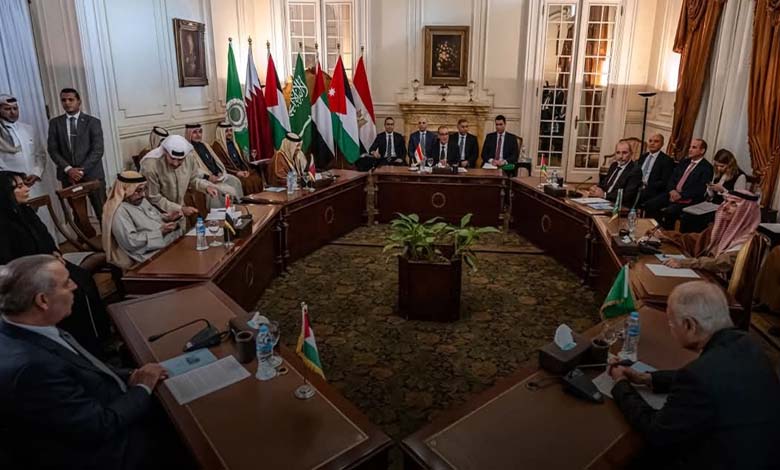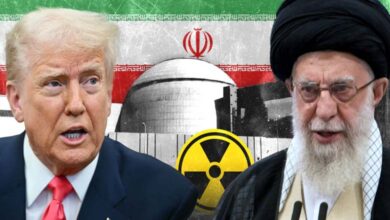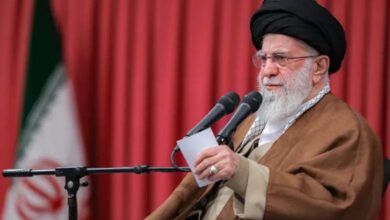Arab Rejection of Palestinian Displacement Under Any Circumstances

The foreign ministers of Egypt, Saudi Arabia, the United Arab Emirates, and Jordan have reaffirmed their countries’ firm opposition to the uprooting of Palestinians from their land under any circumstances or pretext.
Following their meeting in Cairo on Saturday, the foreign ministers of Egypt, Saudi Arabia, the United Arab Emirates, and Jordan firmly rejected the forced displacement of Palestinians or any encouragement of their transfer. They expressed their hope to work with Donald Trump’s administration to implement a two-state solution.
-
The UAE and 8 Arab States confirm rejection of the Palestinian issue settlement and displacement
-
Decisive Hours: Intense Arab Efforts to End the Gaza War Quickly
In their final statement, the ministers emphasized their “rejection of any violation of Palestinian rights through settlement activities, eviction, home demolitions, land annexation, or through displacement, transfer, or uprooting of Palestinians from their land in any form or under any circumstances or justifications.”
The meeting, convened at Cairo’s initiative, was attended by Hussein al-Sheikh, Secretary-General of the Executive Committee of the Palestine Liberation Organization (PLO), and Ahmed Aboul Gheit, Secretary-General of the Arab League. A statement issued afterward praised the crucial role of the United States in brokering the ceasefire in Gaza and expressed a desire to work with the Trump administration to achieve a just and comprehensive peace in the Middle East based on a two-state solution.
-
Washington Seeks Normalization Between Israel and Saudi Arabia Before Presidential Elections
-
Settler Violence in the West Bank: Intimidation Despite Politics and Military
The meeting came less than two weeks after Trump took office and a week after he proposed relocating Palestinians from Gaza to Egypt and Jordan.
The participants urged the international community to “coordinate efforts to plan and implement a comprehensive reconstruction process in Gaza as soon as possible, ensuring the Palestinians remain on their land.”
They also called for the concrete implementation of the two-state solution to address the root causes of tension in the Middle East, stressing the importance of maintaining the ceasefire in Gaza. The ceasefire, which took effect on January 19 through U.S., Qatari, and Egyptian mediation, should be accompanied by the removal of all obstacles to humanitarian aid entering the besieged territory.
-
In Gaza: Bombing and Overcrowding, Two Faces of One Death
-
Where is Sinwar in the Gaza Negotiations? Hamas Leader Reveals His Role and Communication Methods
The ministers further demanded “the complete withdrawal of Israeli forces from Gaza and the empowerment of the Palestinian Authority to assume its responsibilities in the territory as an integral part of the occupied lands, alongside the West Bank and East Jerusalem.”
They emphasized “the indispensable and irreplaceable role of the United Nations Relief and Works Agency (UNRWA),” following Israel’s decision to cut ties with and ban the organization.
The idea of removing Palestinians from Gaza, which they see as part of their future state, has always been a nightmare for Palestinian leadership and has been repeatedly rejected by neighboring Arab states since the onset of the Gaza war in October 2023.
-
How Did Hamas Leader Fall into the Beggar and Vendor’s Trap? Details of the “Ghost” of Hamas Assassination
-
Israel’s Withdrawal and Gaza’s Return to Palestinian Authority: Abbas’s Vision for the Post-War Era
Millions of Palestinians already live in Jordan, while tens of thousands reside in Egypt. Both the Egyptian and Jordanian foreign ministries rejected Trump’s proposal last week.
On Friday, thousands of Egyptians gathered at the Rafah border crossing to protest against the forced displacement of Palestinians. Similar demonstrations took place in various governorates across the country.
On Thursday evening, protests erupted across several Egyptian governorates, including Beheira, Kafr El Sheikh, Gharbia, Port Said, Ismailia, Sharqia, Qalyubia, and Beni Suef, rejecting any attempt to expel Palestinians.
-
How the Brotherhood’s Media Handled Haniyeh’s Assassination: Has Hamas Lost Its Importance to the Brotherhood?
-
Agreement between Hamas and Fatah to form a temporary national reconciliation government
On Wednesday, Egyptian President Abdel Fattah al-Sisi stated in a press conference in Cairo that “the expulsion or displacement of the Palestinian people is an injustice in which we will not take part.” He reaffirmed Egypt’s commitment to working with the U.S. president to achieve peace based on the two-state solution.
Finally, opposition to Trump’s proposal was voiced by Jordan, Iraq, France, Germany, the Arab League, the Organization of Islamic Cooperation, and the United Nations.












